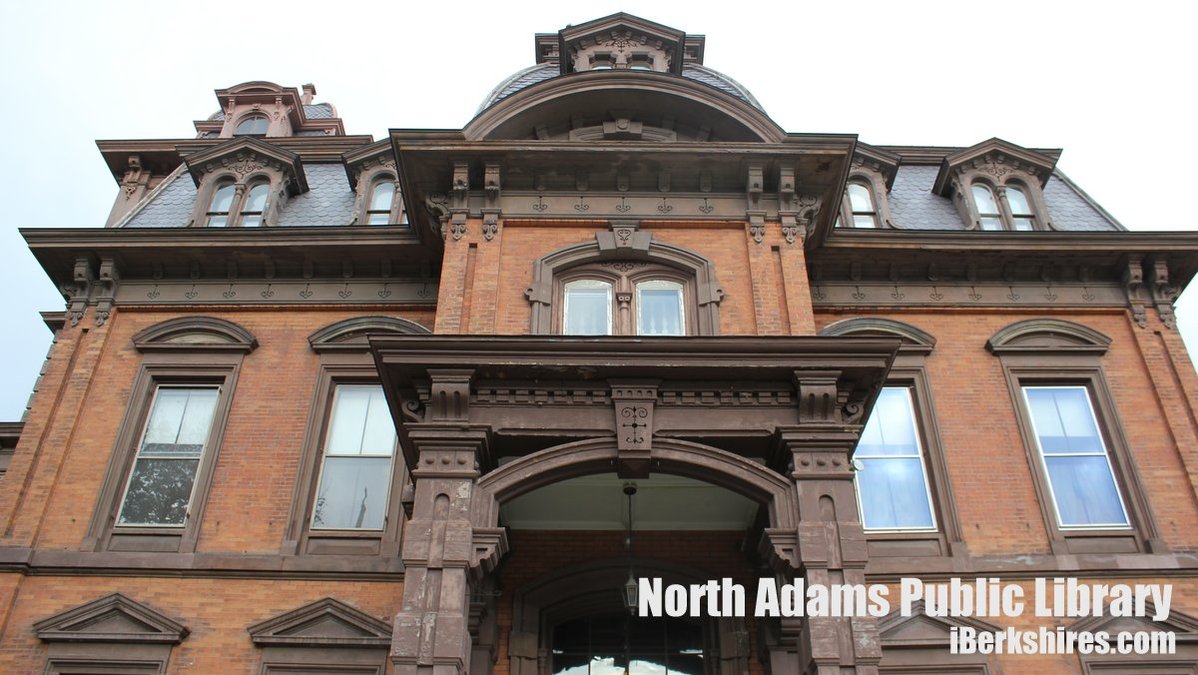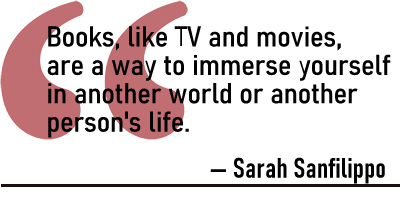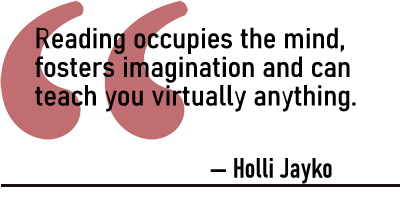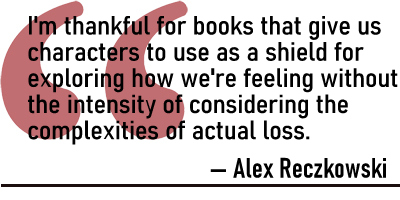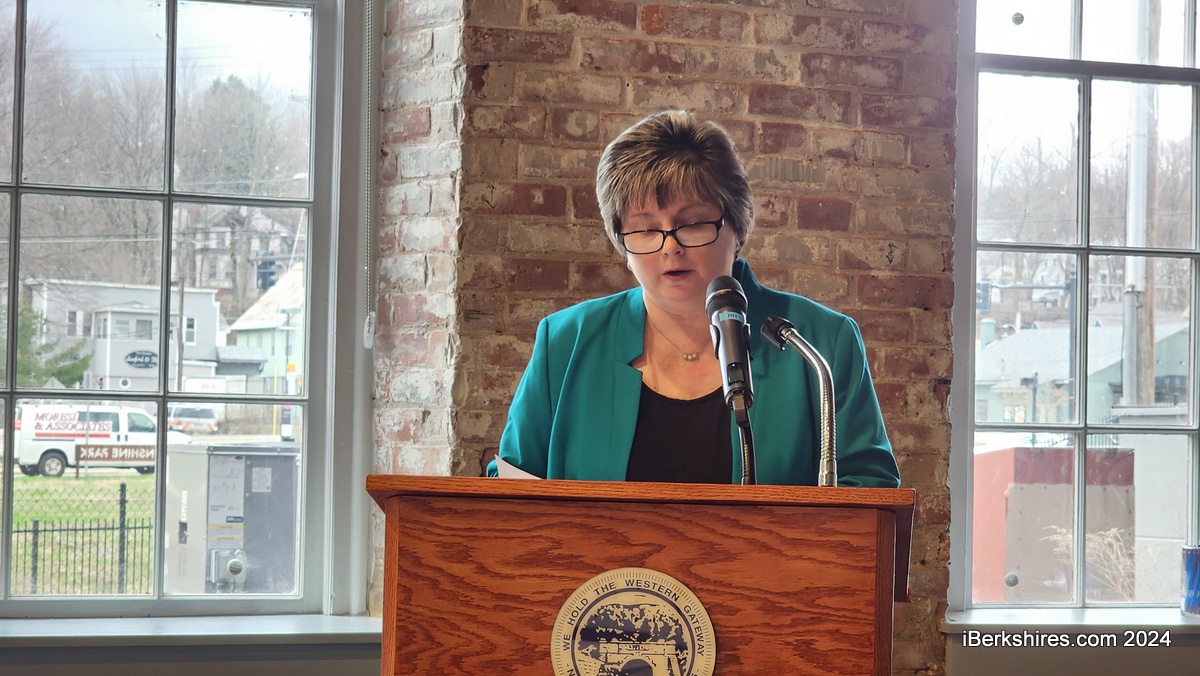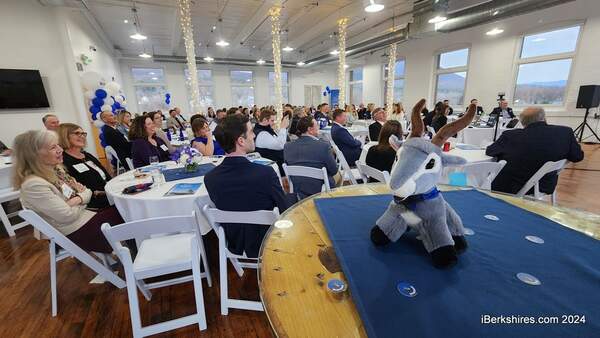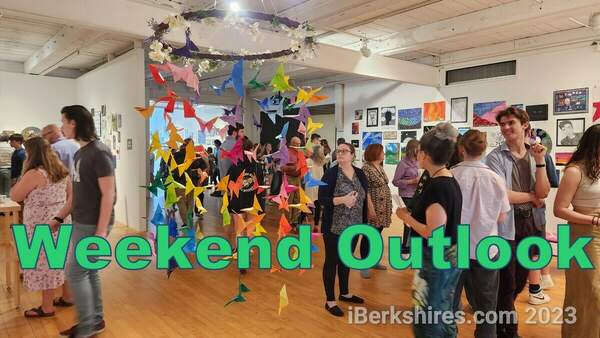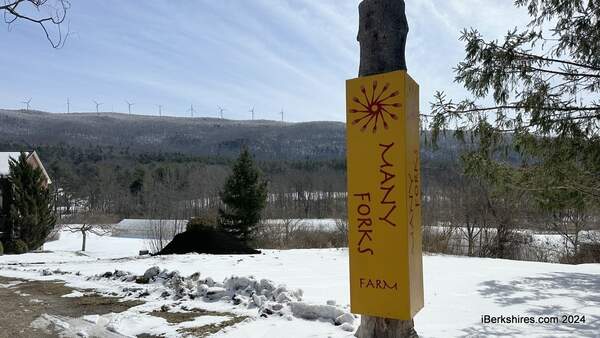With many people spending more time at home, we spoke with some of our local library directors about what their libraries can offer to keep children and adults not only entertained but informed. Even with the doors closed because of the COVID-19 pandemic, libraries have a wealth of resources and ideas that can accessed online.
We asked questions of Sarah Sanfilippo of the North Adams Public Library, Holly Jayko of the Adams Free Library and Alex Reczkowski of the Berkshire Athenaeum.
Sarah Sanfilippo, North Adams Public Library
Q: Instead of just turning on the TV during self-isolation why would you urge folks to pick up a book instead?
A: TV is awesome when you need to relax and veg out. With this week's rain and cold, my family has watched "Frozen II" three times in three days ... But reading engages your brain in a different way. Unless you're reading picture books, you have to imagine the visuals in a book. And unless it's an audiobook, you have to read. It's active participation, rather than passive intake. It keeps the synapses firing. Often, too, the level of the language in books is at a higher reading level than a lot of TV. It's great for language and vocabulary development.
Q: How can reading become a family activity?
A: I read with my almost-3-year old every night, and often during the day as well. The more we read, the more she wants to read. We talk about the pictures and what's happening in the story. When she asks a question about what's happening, I can ask her what she thinks, and see what she comes up with on her own. Even with older kids or just with your spouse, books — or articles — can be great conversation starters. It's a good escape from the news. If you had to cancel a vacation, maybe read articles or books about the place you had planned to go — or read about places you plan to travel in the future — or places you wish you could go, like Mars, or Hogwarts.
Q: How can reading become a community activity even with social distancing?
A: lot of people I know are trying to move book clubs online, using Zoom or Google Hangouts, or whatever other options they have. The NAPL, like other libraries all over the country, [has been doing] a
Facebook storytime here.
Q: People are upset, confused, and nervous about the outbreak. How can reading combat this?
A: Books, like TV and movies, are a way to immerse yourself in another world or another person's life. Even if it's a serious or scary story, it's a story that takes you away from your present reality for a little bit. Read "The Diary of Anne Frank" or "The Martian" and you might feel a little less stressed about your own isolation. If you're someone who doesn't want to escape, then reading — from reliable sources like the New York Times or the [Centers for Disease Control] or local news and community organizations — can help you get your head around what is actually happening and block out some of the social media noise. If you can find the answers to even some of your questions, that's a little less for your brain to obsess about.
Q: What book would you recommend to folks right now?
A: If you like a good (long!) story about strong people living through a difficult time, I just finished "The Nightingale" by Kristin Hannah, about two sisters living in occupied France during World War II, and loved it. One of my favorite authors is Michael Pollan. His book "The Botany of Desire" is about four plants that changed the course of human history, and may be of interest to everyone who's thinking about getting their garden started. And his recent book about therapeutic use of hallucinogens is fascinating. It's called "How to Change Your Mind."
Q: What services are available right now even though the library is closed?
A: Even though staff is not at the library, we're checking voicemail, and answering emails, to assist with accessing our materials or answer reference questions. As mentioned above, Sara Russell-Scholl, our youth librarian, is planning storytimes online. All of our online resources and ebooks are available 24/7. You need a library card number to access those, but we can set you up if you don't have one already. Many ebooks are loaned like physical books — only one reader at a time — so there are wait times for the popular ones. But we've added over 4,000 classics, thanks to the publisher making them available, that any number of people can read simultaneously. Just search "Duke Classics" in our catalog to find authors like Mark Twain, books like "Little Women," Shakespeare's sonnets, or Greek philosophers.
Most of our communication is happening on
Facebook these days. This week we're starting themed postings of resources.
-
Education Mondays: resources to aid home-bound parents, kids, and teachers
-
Healthy Tuesdays: self care, healthy living, and more
-
Research Wednesdays: tips and resources from our Reference and Local History experts
-
Community Thursdays: links to community organizations, social resources, reliable local information
-
Pot Luck Fridays: maybe some book and movie reviews, other fun ideas — what are YOU looking for? Tell us in the comments
Holli Jayko, Adams Free Library
Q: Instead of just turning on the TV during self-isolation why would you urge folks to pick up a book instead?
A: Mason Cooley said it best, "Reading gives us someplace to go when we have to stay where we are."
Q: How can reading become a family activity?
A: Reading together will give you time with one another and time away from electronic devices. Reading out loud engages our sense, gives you an opportunity to be expressive, to use your imagination, and breathes new life into your favorite characters.
Q: How can reading become a community activity even with social distancing?
A: Families, even though apart, are able to use apps like Skype, Facetime, and Zoom to read together. Kids are able to read to grandparents and other family members and vice versa
There are even book groups still taking place but now on a virtual platform. There are a number of authors reading aloud on Facebook Live, YouTube channels, Instagram etc. There are also libraries doing virtual storytimes like the Middleborough Public Library.
The following is just a small sample of what is happening online to engage the reading community:
Q: People are upset, confused, and nervous about the outbreak. How can reading combat this?
A: Reading occupies the mind, fosters imagination and can teach you virtually anything. Books give you the opportunity to escape but also to find information on coping with stress, dealing with anxiety, self-improvement, home improvement, gardening, cooking and pretty much any topic you can think of.
Q: What book would you recommend to folks right now?
A: Any picture book by Jan Thomas ("Rhyming Dust Bunnies" is my favorite), The Gregor Series by Suzanne Collins, and the Alex Cross series by James Patterson
Q: What services are available right now even though the library is closed?
A: The wireless signal remains on and is accessible on the property. Reference assistance is available
by email and at 413-743-8345, Ext. 101. Digital eBooks, and eAudio are available through Overdrive and Libby. Online resources can be found on our website
www.adamslibraryma.org. The following will need a library card to access: A to Z the USA, Acorn TV, Artistworks, Gale Databases, the Great Courses, and IndieFlix. No Library card? No problem, just contact us at the above email or phone and we will set you up.
The following are available without a library card: Audiobook Cloud, Tumble Book Library, Tumble Math, JLG Digital Online, Mo Willems Doodles, Scholastic Learn at Home, ABDO Digital Distance Learning, Teen Book Cloud and Gale in Context.
Alex Reczkowski, Berkshire Athenaeum
Q: Instead of just turning on the TV during self-isolation why would you urge folks to pick up a book instead?
A: When I first posed this to the librarians at the Berkshire Athenaeum, the immediate response was, "Books don't have commercials!" I think this self-isolation might be making our jokes funnier (at least to ourselves).
During self-isolation, we are constantly grappling with our sense of control. The virus can feel out of control — though we recognize that self-isolation is our way of finding control — and, likewise, our feelings can feel out of control. Our sense of order and power in the world feel devastatingly challenged. Books are a powerful and accessible way to regain control.
Pace is a powerful aspect of this control. When we are watching screens — and particularly videos — the medium controls the pace. Reading lets you dictate the pace. With a book, if a sentence (or a paragraph or a chapter or the whole thing!) feels challenging, you can re-read it. You can go back two paragraphs and re-read them. You can put the book down and stare out the window until you're ready to come back and re-read it. You are in control.
Books let us focus and give us a break from other decisions. Here — and I might be showing my age by admitting this — I find physical books have an advantage over ebooks. With a physical book, my impulse is to stick with the story, rather than flip over to another app (or respond to an email or check social media) in the middle of a thought. This gets me away from the wandering scroll, which can be an energy drain. Decision fatigue is real, and even those little decisions of "should I like this post?" add up. When I focus on a book, the biggest decision is, "should I finish this chapter or get a snack now?"
I'll add one more note about control. Books give tremendous control to our imaginations. Yes, we have tremendous film-makers, showrunners, and producers, but, ultimately, what we see on a screen is someone else's imagination, someone else's vision. With a book, we retake that power. This power can be particularly valuable to us when we feel like we aren't seeing ourselves on screens.
Q: How can reading become a family activity?
A: Reading together is a powerful way to be present together. Sure, we may be "in each other's presence" more than feels comfortable right now, and being present together is one way of making that more comfortable and more meaningful.
We usually think about reading to children, but adults enjoy the action too! That's evidenced by the popularity of our audiobook collections at the library, (and, yes, we have streaming audiobooks available). Plus, many of us have technology that removes the geographic barriers of reading together. I particularly like it when kids read to adults. We're all very quick to say, "children are our future." We might be well served by listening to kids, then. Isn't it amazingly powerful to have someone giving you their attention? Isn't this an awesome gift to give young people, too?
Having worked for years in theater and specifically with Pittsfield Shakespeare in the Park, I have to mention that families can have a lot of fun reading plays together. [Plus, Shakespeare's works are in the public domain, so they're rather accessible online.] Really, what better [family] activity than reading together? If we want to get academic about it, college is "co-legere" or "to read together." When we bring up an academic setting, we're used to a pattern of reading-reacting-asking questions-thinking- discussing; let's bring that to our family patterns and create space for having meaningful conversations.
Those meaningful family conversations are some of our most valued treasures. Books can help lay the groundwork for good conversations, even tough conversations. [Here's the tough conversation …]
This pandemic that we are experiencing is devastating. We are expecting to lose friends and loved ones. Getting some practice with talking about how we're feeling can help. Just writing this makes me want to go back and read "Charlotte's Web" ... I want some practice thinking and talking about death. I'm thankful for books that give us characters to use as a shield for exploring how we're feeling without the intensity of considering the complexities of actual loss. Latest book I finished was Peggy Orenstein's "Boys & Sex": Young men on hookups, love, porn, consent, and navigating the new masculinity. (It is a recent follow-up to her 2016 "Girls & Sex: Navigating the Complicated New Landscape.") In it, she reveals that the young men she interview surprised her by being remarkably candid and open and vulnerable. She found that once she created space and time for them to talk and once she asked them how they were feeling, they opened up. She urges parents and families to make safe, even if awkward, opportunities for tough conversations.
Q: How can reading become a community activity even with social distancing?
A: Our communities are already sharing reading and stories; we can't help ourselves! I've mentioned "Charlotte's Web" and Shakespeare, and there are notable community readings available — Meryl Streep has a renowned reading of "Charlotte's Web," and I've heard that Patrick Stewart has taken to posting his
daily reading of a Shakespearean sonnet.
When I think of our stereotypical image of a book group, I imagine a bunch of people holding court (and holding a wine glass). Right now, we can do it over videoconferencing or conference calls (and no need for a designated driver).
Q: People are upset, confused, and nervous about the outbreak. How can reading combat this?
A: We need to give ourselves a break. Reading offers us an escape from the world around us. A good book keeps you in the moment and rapt in another world. Discover a new place, or a new time, even, with a new book. Or, maybe it's not the time for you to discover a new place. Maybe it is time to revisit an old favorite. There can be great comfort in the familiar. Revisit a favorite story or a favorite author, and allow yourself that comfort.
Q: What book would you recommend to folks right now?
A: Following the logic of the last question, I recommend revisiting a favorite. For me, that's the short stories of Amy Hempel. Sing to It is her latest collection, and I particularly recommend the title story.
Another general recommendation I would give is: read that book. You know the one. It's been floating around the house for a while. You always wanted to read it, you still want to read it, but it's the kind of book that requires an investment. You have to get to know the characters and the plot a bit to get really sucked in. If you just had a morning to commit to diving into the first few chapters, then you wouldn't be able to stop yourself. Go for it.
I asked our librarians how they escape. One is revisiting the thriller "The Day of the Jackal" by Frederick Forsyth. Another of our librarians loves stories with rich, complex characters, and she recommends Louise Penny's great murder mysteries.
When asked about stories that they shared with their families, "Alice in Wonderland" and "Through The Looking Glass," "Lord of the Rings," Harry Potter, and "The Lion, the Witch and the Wardrobe" were favorites for sharing together.
There is an art to recommending the right book (we librarians call it readers' advisory), so if you're looking for the right book for you, reach out to us. Visit our website or email
info@pittsfieldlibrary.org or call and leave a voicemail (413-499-9480) and we'll help you find your personalized recommendation.
Q: What services are available right now even though the library is closed?
We have a ton of online resources, including ebooks, emagazines, and streaming movies and music. We've been talking about connecting to our families, so I would be remiss if I didn't give a special shout-out to our expanded genealogy resources: Ancestry Library Edition, American Ancestors, Fold3, and Heritage Quest Online are all available from home with your library card right now. Our website has all of the resources spelled out better than I can describe them, so visit
pittsfieldlibrary.org. We are also answering questions remotely through email and voicemail.
